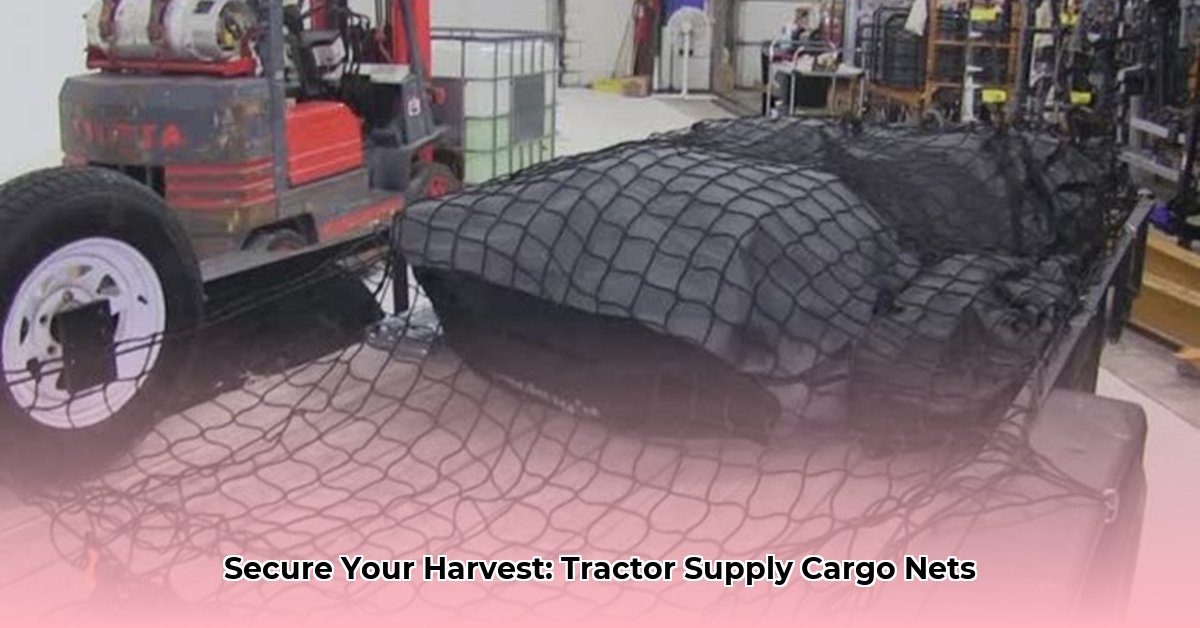
Choosing the right tools is crucial for efficient and sustainable farming. Tractor Supply cargo nets offer a surprisingly versatile solution for transporting everything from hay bales to farm equipment, significantly impacting your operations' environmental footprint and bottom line. For more information on farm supplies, check out Tractor Supply resources. Let's explore how to maximize their benefits.
Exploring Tractor Supply's Cargo Net Options
Tractor Supply offers various cargo nets, each suited for specific needs. Before purchasing, consider size, material (polypropylene and nylon are common), and weight capacity. A small net might suffice for tools, while heavier-duty nets are necessary for large equipment or multiple hay bales.
| Net Type | Material | Approximate Weight Capacity (lbs) | Best Uses | Considerations |
|---|---|---|---|---|
| Light-Duty | Polypropylene | 500 - 1000 | Smaller tools, equipment parts, lighter supplies | Suitable for infrequent use, lighter loads. |
| Medium-Duty | Nylon | 1000 - 2000 | Hay bales, feed bags, moderate-sized equipment | Versatile choice for most farm tasks. |
| Heavy-Duty | Reinforced Nylon | 2000+ | Large equipment, heavy machinery components | Essential for very heavy or bulky items. |
Always check the net's label for its safe working load. Overloading can cause breakage, damage, and injury. Isn't safety a top priority on your farm?
Securing Your Loads: Safety and Environmental Responsibility
Securely transporting goods prevents losses, accidents, and environmental hazards. Follow these steps:
Weigh Your Load: Accurately weigh your cargo using a scale to ensure you select a net with adequate weight capacity. Guesswork is dangerous and inefficient.
Even Distribution: Distribute the weight evenly across the net to prevent undue stress on any single area.
Strategic Tie-Downs: Use strong tie-down points on both your vehicle and cargo, ensuring they're rated for the weight being transported.
Multiple Nets: For heavy loads, use multiple smaller nets for better weight distribution and increased security. Is redundancy ever a bad thing when it comes to safety?
Regular Inspections: Regularly check your secured load, especially on rough terrain. Adjust the net as needed to maintain security.
Reducing Waste: Sustainable Practices in Action
Single-use plastic packaging is a major environmental concern in agriculture. Reusable cargo nets offer a substantial eco-friendly alternative, significantly reducing your farm's plastic waste footprint. This simple switch can have a large positive impact on the environment. How many plastic bags do you think you'll avoid this year?
Fuel Efficiency and Smarter Transportation
Efficient loading and unloading practices are key for fuel efficiency. Strategic packing maximizes space, minimizing trips and fuel consumption. This reduces your operating costs and harmful emissions. Don't underestimate the cumulative benefit of smart loading over time.
Extending Net Lifespan: Care and Maintenance
Proper care extends the lifespan of your cargo nets, saving money and reducing waste. Avoid dragging nets on rough surfaces, clean them regularly to remove debris, and store them in a dry place away from direct sunlight to prevent damage and rot. A little care goes a long way.
Responsible Disposal: The Final Step in Sustainability
When nets reach the end of their life, explore responsible recycling options. Some recycling centers accept plastic nets; others may have repurposing programs. Check with your local facilities for details. Responsible disposal completes your commitment to sustainable farming.
Case Study: Reducing Waste and Improving Efficiency
One farmer switched from plastic wrapping to cargo nets for hay bales, experiencing a noticeable reduction in plastic waste and improved transportation efficiency, proving that sustainable choices can benefit both the environment and the bottom line. This is a shining example of how one small change can yield significant improvements.
Key Takeaways:
- Tractor Supply cargo nets provide durable, reusable solutions for sustainable farm transport.
- Proper usage minimizes waste and optimizes transportation efficiency, benefiting the environment and your bottom line.
- Careful maintenance and responsible disposal extend net lifespan and minimize waste.
- Combining cargo nets with precision farming techniques maximizes productivity and sustainability.
By adopting these practices, you'll enhance your farm's efficiency, reduce environmental impact, and contribute to a more sustainable agricultural future. The benefits are clear—it's an investment worth making.